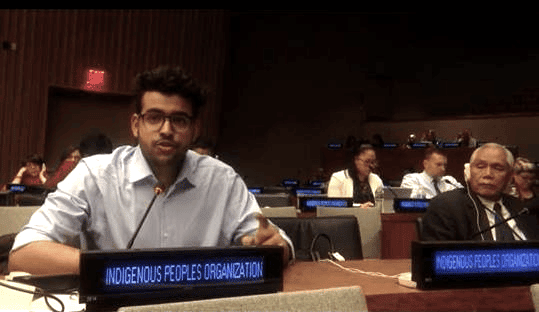New York, April 21, 2018
Madam Chair, Distinguished delegates, Ladies and Gentlemen,.
I am Ibrahim Mouhamadine and go by Akli, an Amazigh Tuareg native from the Tuareg land, i am speaking on behalf of Imouhagh International Organisation for the Sake of justice & Transparency.
Since the creation of the post-independence states in the Sahara in 1960s, my people, the Tuaregs, have suffered consequences of climate change. The governments of the region impose restrictive laws on us that prevent us from our sustainable living.
Madame Chair, Brothers and Sisters,.
These governments seized our land and do not allow us to follow our traditional way of living which was granted by the United Nations Declaration on the Rights of Indigenous People. For example, for more than 48 years, the Nigerien government has been poisoning our water, air and land, and restricting our herders from owning even one square meter of our own historic land in violation of article 10 and 26 of the United Nations Declaration on the Rights of Indigenous People.
In addition, the Malian government does not respect the peace agreement that the Tuareg movements signed with them 3 years ago; this violates article 37 of the United Nations Declaration on the Rights of Indigenous People. Meanwhile, the internationally recognized-Libyan government does not consider the Tuaregs born on Libyan soil as citizens due to their lack of social security identification, which is never made available to them, in violation of article 6 of the U.N. Declaration on the Rights of Indigenous People.
All of these governments have failed to keep us and our land safe from marauders and terrorists, when we simply wish to live in peace with the land and our neighbors. These above mentioned-laws are against the basic rights of indigenous peoples and should therefore be abolished, so that we may live in harmony and with the same rights as other citizens. We hope that the United Nations will include the Tuareg case in its next Report of the Special Rapporteur on the rights of indigenous peoples.
Madam Chair,.
We plead that the United Nations, the member states, all relevant stakeholders to work with us, indigenous peoples, to execute the 2030 agenda: Leaving no one behind.
My fellow indigenous representatives, member states:
The above-mentioned statements are crucial for the Tuaregs, the traditional and proud masters of the Sahara Desert and its caravan trade, and our lifestyle to continue living or disappear until we are completely eliminated from the face of the earth.
Thank you

